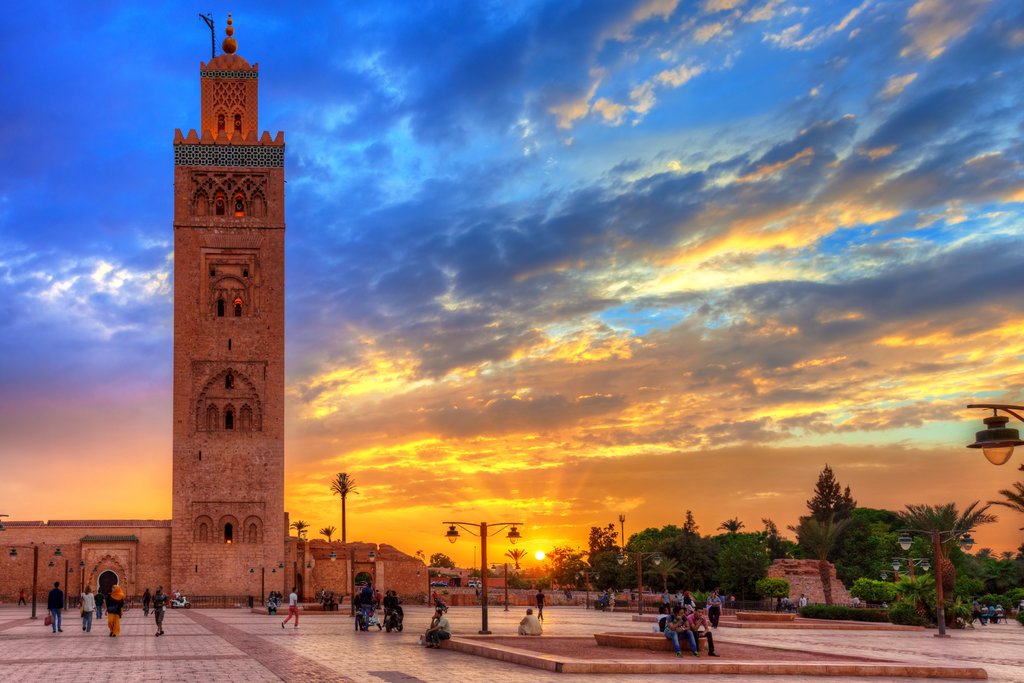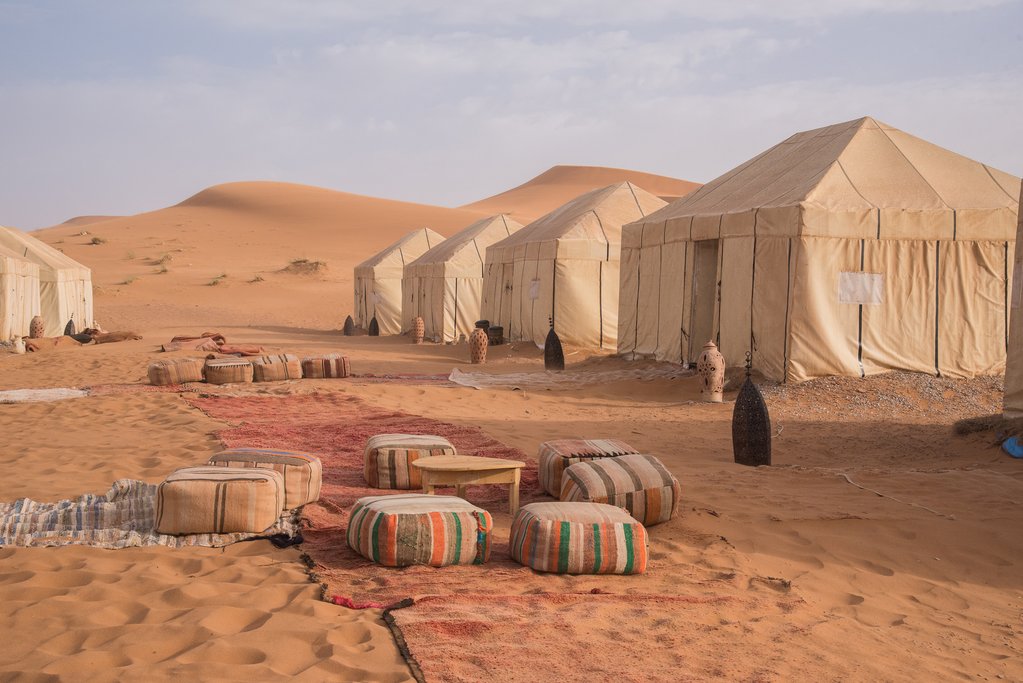Highlights
- Explore Marrakesh’s historic souks, palaces, and plazas
- Sip mint tea with locals and hike to Berber villages in the Imlil Valley
- Ride a camel through the Sahara Desert and camp under the stars
- Visit the palm-fringed oasis towns of Skoura and Zagora
- Taste traditional Moroccan food with a cooking class in Essaouira
Brief Itinerary
| Day | Highlights | Overnight |
|---|---|---|
| Day 1 | Arrive in Marrakesh | Marrakesh |
| Day 2 | Self-Guided Exploration of Marrakesh | Marrakesh |
| Day 3 | Mountain Hike in Imlil & Lunch with a Local Family | Imlil |
| Day 4 | Imlil Valley Guided Hike | Imlil |
| Day 5 | Transfer to Skoura Oasis via Aït Benhaddou & Ouarzazate | Skoura |
| Day 6 | Skoura Oasis Walk, Pottery Factory & Lunch with a Local Family | Skoura |
| Day 7 | Transfer to Zagora via Saghro Mountains & Draa River Valley | Zagora |
| Day 8 | Transfer to Erg Chigaga & Desert Camping | Erg Chigaga Desert |
| Day 9 | Day with Desert Nomads | Erg Chigaga Desert |
| Day 10 | Transfer to Taroudant via Foum Zguid Across the Anti-Atlas Mountains | Taroudant |
| Day 11 | Explore Taroudant, Transfer to Essaouira | Essaouira |
| Day 12 | Private Cooking Class, Free Afternoon in Essaouira | Essaouira |
| Day 13 | Return to Marrakesh, Food Tour, Henna or Babouche Workshop | Marrakesh |
| Day 14 | Depart Marrakesh |
Detailed Itinerary
Day 1: Arrive in Marrakesh

Welcome to Morocco! Touch down in Marrakesh, where your driver will be waiting to take you to your hotel. Settle in before exploring the city's winding souks (markets) and famous landmarks. For some culture, visit the Yves Saint Laurent Museum or Berber Museum, or indulge in a hammam, a traditional steam bath, and body scrub.
In the evening, head to Jemaa el-Fna, the city's landmark plaza filled with markets, street food, and performers. Watch locals prepare authentic delicacies and taste the flavors of Marrakesh as the sun goes down and the street performers come out to entertain.
Day 2: Self-Guided Exploration of Marrakesh

Start the day with an optional tour of Marrakesh, known as the "Red City" for its 1,000-year-old red sandstone walls and buildings. The city has Berber roots and was once a key trading hub for tribes in the Atlas mountains. Follow your guide through the medina (old town) and maze-like souks, including Souk el Attarin, Souk Chouari, and Souk Smata, which offer a selection of spices, woodwork, and babouche (Moroccan slippers).
Next, visit the 19th-century Bahia Palace, which showcases intricately-carved woodwork and painted ceilings, then continue to the city's largest mosque, Koutoubia. The tour ends at the 12th-century Menara Gardens, a UNESCO-protected public park. Other city highlights include a sunrise hot-air balloon ride and a trip to Le Jardin Secret, a complex of palaces set within a garden in the central medina.
Day 3: Mountain Hike in Imlil & Lunch with a Local Family

Say goodbye to Marrakesh this morning and drive into the High Atlas mountains, which form a barrier between the Sahara Desert and the coast. The route takes you through lush valleys dotted with villages belonging to the original inhabitants of the land, the Amazigh (Berber) people. Stop at the city of Asni, known for its sprawling weekly souk. Next, you'll drive between the Atlas mountains and the striking Moulay Brahim Gorge.
Your next destination is Imlil Village in the heart of Toubkal National Park, home to the tallest peak in North Africa, Mount Toubkal. Once you arrive, have a glass of mint tea with your guide before hiking to the Berber village of Armed, the highest in Imlil Valley, where you'll see traditional houses and learn about farming techniques. Spend some time with a Berber family as you hike through the village of Aït Souka back to Imlil for a relaxed evening.
Day 4: Imlil Valley Guided Hike

Today you'll soak up incredible views of the Atlas mountains and Mount Toubkal, which soars 13,671 feet (4,167 m) into the sky. With the help of a private guide, hike in the Imlil Valley, meeting locals and learn about the area's history. Enjoy the scenery as you pass forests and trek alongside streams, stopping at panoramic vistas along the way. The route will take you through Berber villages, where you can sit with the residents and hear their stories.
Day 5: Transfer to Skoura Oasis via Aït Benhaddou & Ouarzazate

Continue over the High Atlas mountains today toward the arid dunes of the Sahara Desert. En route, you'll stop at Taddert to visit an argan oil cooperative and drive over the spectacular Tizi n'Tichka Pass. Spiral down mountain roads to Ouarzazate, the movie capital of North Africa, where movies such as "Lawrence of Arabia," "Gladiator," and "Black Hawk Down" were filmed. Learn more on a studio tour and at the Musée du Cinéma.
Spend the afternoon exploring UNESCO-listed Aït Benhaddou. The ksour (castle) was an essential stop on the trans-Saharan trade route in the 11th century. Wander the alleys and passageways of the old town and climb up to the Granary, which offers views of the kasbah (fort) and historic camel caravan routes. Afterward, make the day's final drive to the oasis town of Skoura, where you'll check into your hotel.
Day 6: Skoura Oasis Walk, Pottery Factory & Lunch with a Local Family

Chat with a local specialist who can help organize your trip.
Discover the desert town of Skoura today, which is known for its mudbrick kasbah and UNESCO-listed palm tree grove, which stretches over 15 miles (24 km). Take a peaceful walk with a guide through the town and shady palm groves, stopping to talk to locals, visit a pottery factory, and learn about the region's farming techniques.
You'll join a family in their home for a Moroccan lunch. As you dine, chat with your host about life in a desert town and learn about typical Moroccan cuisine. The experience ends with a tea ceremony before returning to your hotel for the night.
Day 7: Transfer to Zagora via Saghro Mountains & Draa River Valley

Continue your journey east today, traversing the Jbel Saghro Mountains via the dramatic Tizi n'Tinififft Pass. The route takes you through the fertile Draa River Valley, past dense palm groves, to the desert outpost of Zagora. The city is known for its exquisite dates, considered some of the best in Morocco, which are sold at the bi-weekly souk alongside everything from clothing to vegetables and live animals. Check into your hotel and rest after a long day of travel.
Day 8: Transfer to Erg Chigaga & Desert Camping

This morning, visit the mellah (Jewish quarter) in Amezrou and wander through the area's palm groves. Next, you'll stop at a 16th-century Saadian settlement, Tamegroute, to explore the eerie underground kasbah Sufi Zawiya and tour a factory that makes the region's famous green pottery. In the town of Mhamid, at the end of the Draa Valley, you'll board a Jeep for a 40-mile (65 km) off-road adventure through dunes, plateaus, and a lost oasis.
Take a break to picnic beneath palm trees in the Ras Nkhel oasis before continuing to Erg Chigaga in time to take a sunset camel ride through towering dunes, which shimmer in various shades of red and yellow. Disembark at your desert camp, where you'll enjoy dinner and evening around the campfire with drum music. Dance around the fire or watch the night sky for shooting stars. When it's time for bed, you'll sleep in a typical nomad tent.
Day 9: Day with Desert Nomads

Spend today in the heart of the wild regs (desert plateaus) with the region's nomads, learning what life is like in the Sahara. Help search for grazing ground and water and prepare desert meals. Visit the community's tents, feed the camels, and learn how to weave a camel-wool carpet. You'll also cook over a wood fire using traditional utensils. At the end of the experience, ride a camel back to camp in time for sunset and dinner, followed by a final night under the desert stars.
Day 10: Transfer to Taroudant via Foum Zguid Across the Anti-Atlas Mountains

Hop back in your 4WD this morning to bump across desert dunes along the Paris-Dakar route to Foum Zguid. You'll cross Lake Iriqui, a dried-up salt lake in the Iriqui National Park that becomes a swamp during rainy periods. In this unique park, you can spot wild animals, including lizards, snakes, gazelles, and with a bit of luck, even hyenas. You'll stop for lunch in the Berber village of Taznakht and then continue over the Anti-Atlas Mountains to the town of Taroudant.
Taroudant is a caravan city known as "Little Marrakesh" or "Grandmother of Marrakesh," thanks to its high city ramparts, old town, and lively souks that resemble its namesake. Take a little time to explore before settling into your riad for a restful evening.
Day 11: Explore Taroudant, Transfer to Essaouira

Uncover Taroudant's cultural treasures today. Walk around the town's perimeter to admire its imposing walls and decorative Bab Selsla, Bab Targont, and Bab Ouled Bounouna gates. Then get lost in the spice-scented souks crammed with artisan shops, stalls, and tanneries. People watch in a café or venture outside Taroudant to the Agadir Tasguent granary or lavish mansion Palais Claudio Bravo, designed by a Chilean artist.
In the afternoon, head west to the coastal city of Essaouira, which translates to "fortified palace" in Arabic. The port city is protected by the Skala de la Kasbah, 18th-century seafront ramparts that offer sweeping sea views and are lined with brass canons. Watch sky-blue boats bobbing in the port and waves crashing onto the beach.
Spend the rest of the day exploring Essaouira independently. Ramble through the UNESCO-protected medina, where you can shop in the marketplace and pause for tea in Mulay El-Hassan, the central square lined with restaurants and cafés. Other highlights include the vibrant mellah, where you can stop at the 18th-century Rabbi Haim Pinto and the 16th-century Portuguese Castelo Real.
Day 12: Private Cooking Class, Free Afternoon in Essaouira

Enjoy Morocco's flavorful cuisine this morning with a cooking class. Join an expert chef at a riad in the city, who'll teach you how to make one of the country's most famous dishes: tajine, which is named after the ceramic pot it's cooked in. Prepare your tajine with a mix of meat, vegetables, and fruits, then feast on your creation with plenty of mint tea.
Spend the afternoon as you please. Relax at a hammam or, if you're feeling active, head out into the desert for an ATV or sandboarding trip. Known as the "Windy City" for its strong Alizé trade winds that hit its crescent beach, Essaouira is a popular kiteboarding destination. Watch the windsurfers and kiteboarders ride the waves, or if you're feeling adventurous, take a lesson yourself.
Day 13: Return to Marrakesh, Food Tour, Henna or Babouche Workshop

Say goodbye to Essaouira this morning and drive inland back to Marrakesh. On the way, you'll pass through argan tree groves, where you may spot tree-climbing goats. Settle into your hotel and relax before your afternoon food tour.
Accompanied by a foodie guide, you'll tour the city, tasting 10 local delicacies, from Morocco's sweets to a savory tajine. Along the way, you'll learn about the essential ingredients and cooking techniques used in Moroccan cuisine. Alternatively, you can participate in a henna workshop or design your own pair of babouche.
Day 14: Depart Marrakech

Today your grand Morocco tour comes to an end. Your driver will take you to the airport in time to catch your homebound flight. Safe travels!


